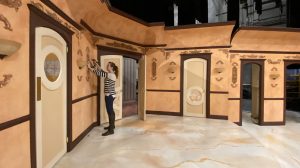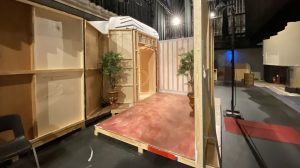
Keeton Landfair (left) plays Bernard, an American playboy in Paris who is juggling three fiancees, all airline stewardesses, played by Lydia Meyers, Elizabeth Burrow and Hannah Bosworth, in the Ole Miss Theatre production of ‘Boeing, Boeing.’ Photo by Kevin Bain/Ole Miss Digital Imaging Services
OXFORD, Miss. – “When one door closes, another opens.” This well-known aphorism, coined by Alexander Graham Bell and often trotted out in times of difficulty or missed opportunity, doesn’t typically refer to literal doors – unless you’re watching Ole Miss Theatre and Film‘s frenetic production of “Boeing Boeing,” set to open Friday (Feb. 14), at the University of Mississippi.
The play, a 1960s-era farce written by French playwright Marc Camoletti, debuts at 7:30 p.m. in Meek Auditorium and runs through Feb. 23, with additional performances at 7:30 p.m. Feb. 15-16 and 18-22 and 2 p.m. Feb. 15-16 and 22-23. A reception will follow the opening night show; the 2 p.m. staging on Feb. 15 will include ASL interpretation and open captioning for people who are hearing impaired.
“Boeing Boeing” takes place over a single long and hectic day in the life of Bernard, an American in Paris who has contrived a “foolproof system” for juggling three fiancees – all stewardesses from different countries who fly on different airlines. But when their schedules change, Bernard’s “airtight” timetables are about as useful as Monopoly money at preventing all three women from crash-landing at his apartment at the same time.
Bernard, his bemused friend Robert and Bernard’s long-suffering housekeeper, Berthe, scramble in a hilarious effort to prevent the women from encountering one another.
“It’s complete chaos,” said Rory Ledbetter, associate professor in the Department of Theatre and Film and the play’s director. “(Bernard’s) perpetual motion goes right out the window.”
Comedy isn’t always easy to get right, Ledbetter said.
“Comedy is hard, because it’s all about precision and silence,” he explained. “Usually laughter is a release of tension, and that tension is created by a couple different ideas,” for example, things taking an unexpected turn, or a character having a reaction that seems uncharacteristic.
“But usually it’s an instant thought that triggers the laughter, so if the rhythm isn’t right, the tension doesn’t get built,” Ledbetter said, adding that the joke, as they say, “doesn’t stick.”
Junior Hannah Bosworth, of San Diego, who plays German stewardess Gretchen, has never done farce or played a strictly comedic role before, but she is relishing the opportunity to play a character that she considers to be very much unlike her.
“Gretchen is sooooo dramatic,” Bosworth said, stretching the vowel for several seconds. “And I think a lot of her comedy comes from her switch between being really romantic and dramatic and all over the place and the Germanic, militant side: Hep!” (At this, Bosworth chops one palm with her other hand held like a cleaver.)
“I think she likes to do things just for the drama, or to say things because of how wonderfully, extremely dramatic and romantic they will be. I just love how big and bold she is. My favorite thing about playing her is getting to be so over the top – it’s not a person that I am at all.”
Catherine Long, a junior from Atlanta who is making her Ole Miss Theatre debut in the role of Berthe, recalled that though her father said growing up, she was always “accidentally funny,” she didn’t realize until her sophomore year that she might be interested in comedy. And now it’s her favorite genre.
“I would really like to do standup one day,” Long said, observing that in standup it’s still relatively new for women to be funny and make fun of themselves, which she finds exciting. To have an opportunity to play high comedy as a woman is something she loves about “Boeing Boeing” as well.
“There aren’t that many shows where the women get to be so funny. So that’s really refreshing about this show. It’s really interesting how gender plays such a big part in the show.
“Speaking of Berthe, at that time, she could probably only be a maid. Her choices were probably to be a maid or stay at home and have a family.”
Long noted that though Berthe is older, and the younger women have jobs that allow them to see the world, still, “they all have the urge to just get married and have babies. I think it’s interesting to see how much it’s changed in such a short amount of time.”

Scenic designer Mandy Goynes works on the set for the Ole Miss Theatre production of ‘Boeing, Boeing.’ Photo by Katherine Stewart/Department of Theatre and Film
While Bernard spends time studying his flight timetables to make sure at least two of his fiancees are in the air at any given time, Berthe is the one who keeps all the home fires burning to each of their specific preferences: cooking the foods they like, swapping out photographs so the right face is always smiling back from the nightstand.
“She’s doing all this behind-the-scenes work, and all she wants is appreciation … and for him to just grow up and pick one of the girls,” Long said.
This sentiment is one Robert, Bernard’s friend from Wisconsin, might understand. Robert’s assessment of Bernard’s romantic arrangements swings from perplexed to impressed and back again, and though he appears to be on the brink of getting wound up in romantic entanglements of his own, at times he seems to sympathize with no one more than Berthe.
Oxford native Jacob Heuer, a freshman who made his Ole Miss Theatre debut in last semester’s “Little Women,” has enjoyed tackling the role, which he appreciates simply for the type of person Robert is.
“Robert is just so innocent and likable that you can’t help but smile and laugh at all the things he does in the play,” Heuer said, adding that the role isn’t without its challenges.
“One thing I find difficult is finding the right moments when he can or can’t be super-energized, and the moments where he is dormant and just trying to figure out what’s going on.”
Despite that, Heuer said, having played several comedic roles as a student at Oxford High School, he was accustomed to playing the comedic relief, so he feels he has a knack for getting the audience to laugh and react to his comedic characters.
“I have to say I always love being a part of comedic shows,” Heuer said. “Generally, if I can make an audience enjoy watching a show, then I’m happy to be a part of it.”
While much of the comedy in this show is written into the script, the laughs come from the way the actors bring the dialogue to life – and, in particular, the way they move about the space.
This is where those doors come into play – seven of them, to be exact. In this highly physical show, people are constantly popping in and out of the apartment’s many rooms like critters in an arcade game.
Visiting scenic design professor Mandy Goynes, who designed the set, said creating a realistic apartment with seven visible doors on a small stage was no small feat.
“One of the ways I started to look at the challenge was by looking at ground plans of television sets, shows like ‘How I Met Your Mother,’ ‘Will and Grace,’ and the ‘Frasier’ house,” Goynes said.
“They’re the same thing – they keep the camera at the same wall, and then you see the rest of the room. They’re a fun way to think about how other people have tackled this.”
Goynes said she used 3D computer imaging to figure out how to fit all these doors onto the stage of Meek Auditorium, but noted that it’s not only about the doors themselves but also what’s behind them.
“You wouldn’t have seven doors all facing one thing; architecturally, it doesn’t really make sense,” she said. “And when they go through a door, they can’t just be going into black space.
“There have to be walls behind them – the reveal walls. That was almost more of a challenge, making sure we could fit that backstage.”

Making sure that each of the seven doors onstage has its own reveal wall – a setting that shows what lies behind the door – was a challenge for scenic designer Mandy Goynes while building the set for the Ole Miss Theatre production of ‘Boeing, Boeing.’ Photo by Katherine Stewart/Department of Theatre and Film
Once the placement of the walls and their many doors was determined, Goynes had to figure out how to make it clear that in the world of Bernard’s apartment, it’s France in the 1960s.
“So much of 1960s style is decor that’s on the wall, and when you have seven doors on stage, you don’t actually have a lot of wall space – it’s just door, door, door, door, door,” Goynes said.
“And European ’60s is very different from American ’60s. When people think, at least here, of the ’60s, they think a little bit gaudy: mustard yellows, browns and oranges. That’s not Europe at all – France was very elegant, still stuck in the past a little bit. I need to give the illusion of the ’60s, but also capture France.”
Goynes solved this by placing midcentury modern furniture – “think clean lines, a lot of wood, some accents of metal” – against an old-world European backdrop of plaster walls with beautiful sculptures and molding. In Europe, while it was common to update furniture and accessories, it wasn’t as common to change walls with paint and wallpaper as is done so frequently in the U.S.
It’s all tied together by what might be an unexpected comedic throughline: curves.
“A lot of the furniture has rectangular shapes with touches of curves,” Goynes said. “We are pushing everything more towards curves, because for us, curves read more as comedy, and it’s a comedic show. You’ll see that in the way the doorways are arched, creating some of those softer curved shapes, and you’ll see that mirrored in a lot of the accessories.”
Late one night during rehearsal, as Ledbetter was working with the actors to block a new scene, one of the actors walked across the space, and Ledbetter stopped him, encouraging him to try it again in a more meandering way.
“Drama runs in straight lines, but comedy has a more indirect way of getting from A to B,” Ledbetter advised. “Just remember: semicircles are funnier.”
Tickets for “Boeing Boeing” are available at the UM Box Office at $20 for adults; $15 for faculty, staff and students; and $10 for seniors and children. Box office hours are 10 a.m.-4 p.m., Monday-Friday, and you can reach it by calling 662-915-7411 – or on foot, on one of campus’s many winding paths.